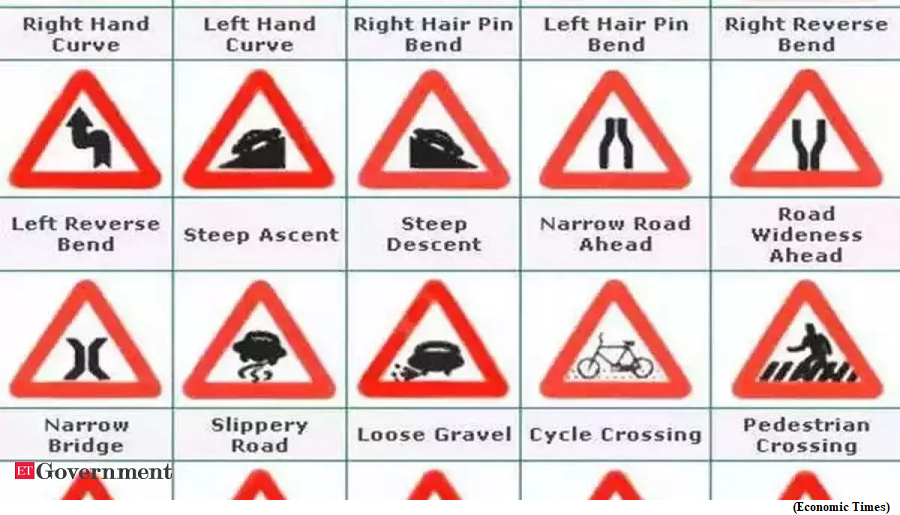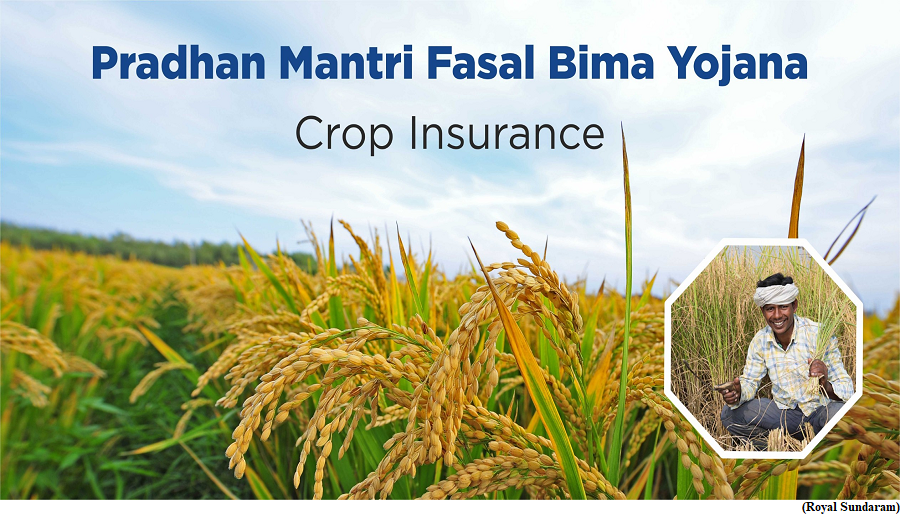Centre releases guidelines for Signages on Expressways and National Highways to enhance Road Safety (GS Paper 3, Infrastructure)

Why in news?
- Recently, the Ministry of Road Transport & Highways (MoRTH) has issued new guidelines for the provision of signages on Expressways and National Highways.
- They focus on further improving road safety by incorporating best practices and world standards to offer improved visibility and intuitive guidance to the drivers.
Significance:
- Road signages are essential components of road infrastructure as they provide vital information and instructions to drivers.
- Accordingly, MoRTH has reviewed the provision of signages as per relevant IRC codes & guidelines, existing practices prescribed in various international codes as well as information and functionality perspective to ensure better compliance of traffic regulations.
- The guidelines are designed to offer drivers clear and concise guidance, warnings, notices, and regulatory information, facilitating a seamless and safe journey on the roads.
Salient features of the guidelines include:
- Enhanced Visibility and Legibility: Prioritise enhanced visibility of road signages through placement at appropriate height/ distance, large lettering, symbols and short legends for quick comprehension of drivers, ensuring crucial information is readily visible and understandable, even in adverse conditions.
- Pictorial Depictions for Intuitive Communication: Pictorial representations along with text to convey essential messages effectively, thus catering to a diverse group of road users, including those with limited literacy.
- Regional Languages: Endorse a multilingual approach on road signages, encompassing both English and regional languages, ensuring effective communication with diverse road users, promoting better understanding and adherence to traffic regulations.
- Focused Lane Discipline: Special attention has been given to promoting better lane discipline, through strategic positioning with clear and intuitive guidance to drivers, encouraging adherence to designated lanes and minimizing traffic congestion.
- Phased Implementation: In the initial phase, the guidelines will be implemented on all upcoming Highways, Expressways, and greenfield corridors. Additionally, Highways experiencing high traffic volume, with more than 20,000 Passenger Car Units (PCUs), will also be prioritized for the implementation of these guidelines.
Way Forward:
- With adoption of best practices and world standards, MoRTH aims to provide a safe and efficient travel experience for all road users, further advancing towards accident-free roads.
Rajasthan passes Bills on minimum income, higher punishment for paper leaks
(GS Paper 2, Governance)
Why in news?
- Recently, Rajasthan became the first and the only State in the country to give social security guarantee to the people with the passage of the Minimum Guaranteed Income Bill in the Assembly.
- The Assembly also passed an Amendment Bill for enhancing the punishment up to life imprisonment for leaking question papers of recruitment exams.

Minimum Guaranteed Income Bill:
- The Rajasthan Minimum Guaranteed Income Bill, 2023, passed with voice vote, gives a guarantee for giving 125 days of employment in a financial year to all families residing in the rural and urban areas and a minimum pension of ₹1,000 every month to the elderly people, specially abled people and widows and single women.
- There will also be guarantee of 15% annual increase in these pensions under the legislation.
- The two main components of the Bill, devoted to employment guarantee and social security, would provide a “combined relief” to the people reeling under the impact of inflation.
- The families residing in the villages will get 25 days of additional employment under the Chief Minister’s Rural Employment Guarantee Scheme after completing 100 days in the Union government’s MGNREGS.
- In the urban areas, the employment of 125 days per family will be given through the Indira Gandhi Urban Employment Guarantee Scheme.
- If the government authorities fail to provide employment within 15 days from the receipt of application, the applicant will be entitled to get unemployment allowance on a weekly basis and in any case not later than a fortnight.
Background:
- The path-breaking legislation would “create history” by giving a legal right to the people to get social security, as it was brought on the lines of the Nyuntam Aay Yojana proposed by the Congress in the 2019 Lok Sabha election manifesto.
Rajasthan Public Examination (Amendment) Bill, 2023:
- The House also passed by voice vote the Rajasthan Public Examination (Measures for Prevention of Unfair Means in Recruitment) (Amendment) Bill, 2023, for enhancing the maximum sentence for the crime of paper leak from 10 years’ jail to life imprisonment.
Technological Advancements in Crop Insurance to Empowering Farmers and Streamlining Operations in PMFBY
(GS Paper 3, Economy)
Why in news?
- The Ministry of Agriculture and Farmers Welfare launched several new technological initiatives under the Pradhan Mantri Fasal Bima Yojana to empower farmers and streamlining the operations.
- He launched several new initiatives under PMFBY and RWBCIS, such as YES-Tech Manual, WINDS portal and door to door enrollment app AIDE/Sahayak, marking a turning point in India's crop insurance landscape.

Rain watch tower:
- There should be a rain watch tower in every village, weather stations can be set up at the development block level, so that the government can get precise information about the weather.
- With the new tender cycle and ongoing enrolment, the efforts taken by the Ministry have now become visible. These significant achievements are a testament to the government's commitment to safeguarding farmers' livelihoods and promoting sustainable agricultural practices.
- The launch of YES-TECH manual and WINDS portal is a result of these steps, enabling accurate loss assessment and improved weather data management.
YES-TECH Manual:
- YES-TECH Manual is a comprehensive guide developed after extensive testing and piloting in 100 districts of India.
- It facilitates the implementation of YES-TECH, a technology-driven yield estimation system, offering methodologies, best practices, and integration insights for accurate yield assessments at the Gram Panchayat level.
WINDS portal:
- On the other hand, the Weather Information Network Data Systems (WINDS) Portal is a centralized platform that hosts, manages, and processes hyper-local weather data collected by Automatic Weather Stations and Rain Gauges at Taluk/Block and Gram Panchayat levels.
- The portal enhances risk assessment and decision-making in crop insurance, agriculture advisories, and disaster mitigation, supporting the agricultural sector and rural economy.
Delinking of subsidies:
- He also announced the delinking of subsidies, which is a groundbreaking step, ensuring that farmers receive their claim payments without waiting for State actions.
- The Centre will now release its share of subsidies independently, providing much-needed relief and financial security to farmers.
AIDE app:
- The AIDE app's introduction on Android platform aims to revolutionize the enrolment process, bringing it directly to the doorstep of farmers.
- This door-to-door enrolment ensures a seamless and transparent process, making crop insurance more accessible and convenient for farmers.
Way Forward:
- With the current launches, the relentless efforts of the Ministry of Agriculture and Farmers Welfare are now visible in the current tender cycle of 2023-25 and farmer enrolment during Kharif 2023, reflecting the commitment towards empowering farmers and safeguarding their livelihoods.




